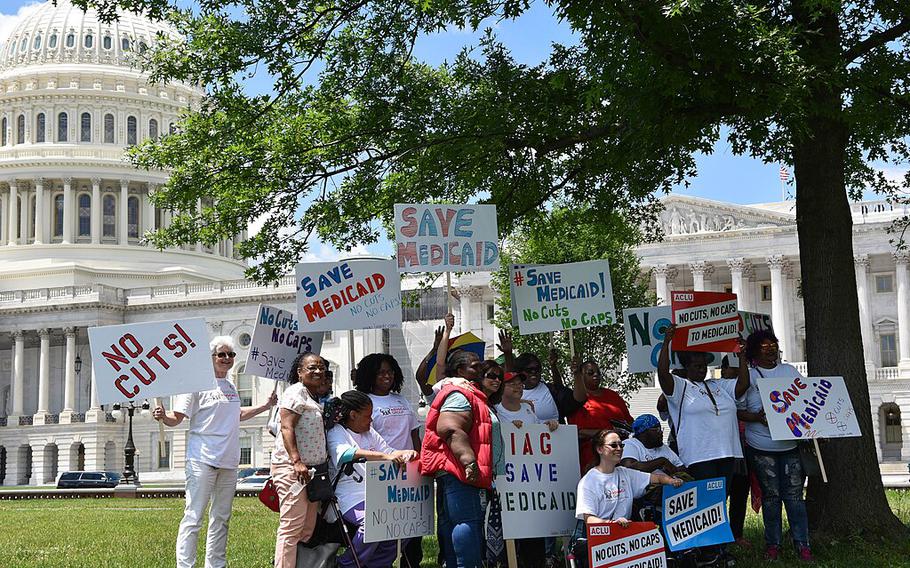
Medicaid reforms in the “One Big Beautiful Bill” Act require adults younger than 65 to work, volunteer or attend school for at least 80 hours per month to keep their benefits. Protesters hold signs outside the U.S. Capitol urging Congress not to cut Medicaid in this 2019 photo. (Senate Democrats/Wikimedia Commons)
WASHINGTON — Disabled American Veterans — an advocacy group with one million members — warned new work requirements and eligibility rules for Medicaid could create hardships for former service members, particularly individuals who are homeless or without a steady income.
Medicaid reforms in the 940-page “One Big Beautiful Bill” Act that President Donald Trump signed July 4 mean adults younger than 65 will have to work, volunteer or attend school for at least 80 hours per month to keep their benefits, according to the bill. States will have to check an individual’s eligibility every six months.
But veterans in rural or underserved areas might lack access to qualifying work or service programs, according to Disabled American Veterans.
The bill also tightens Medicaid eligibility checks and adds costs for some recipients depending on their income level, according to the legislation.
“Burdensome [eligibility checks], work requirements and out-of-pocket costs could cause coverage losses or reduced utilization,” said Matt Saintsing, assistant national communications director for Disabled American Veterans.
About than 1.6 million veterans in 2023 were enrolled in Medicaid, the federal government health insurance for low-income Americans, according to a survey conducted by the U.S. Census Bureau. About half were younger than 65 and subject to the work requirements under the bill.
Veterans with a 100% disability rating will be exempt from the new work requirements, according to the Department of Veterans Affairs. Less than 25% of veterans with a service-connected disability have a total disability rating.
Ben Johnson, 39, an Army veteran who receives Medicaid, said he has an 11% disability rating because of knee and spine injuries from parachuting from airplanes during military service.
Johnson, a former specialist who served from 2010 to 2016, said he has chronic pain and insomnia from service-connected injuries, which impact his ability to maintain steady employment.
“I have eight ruptured discs in my spine, and I blew out my knees,” said Johnson, a domestic worker who lives in California and has been enrolled in Medicaid for about five years. “They’re making it harder for the little guy. This is going to be tough.”
The bill also imposes an employment rule for veterans, homeless individuals and other population groups to continue to receive federal food assistance.
Stricter eligibility rules that require “re-determination every six months for expansion enrollees could result in veterans — particularly those experiencing housing insecurity or fluctuating income — being erroneously disenrolled or forced to navigate more bureaucracy,” Saintsing said.
“Expansion enrollees” are recipients who qualified for coverage under the Affordable Care Act, which raised income limits for single adults to 138% of the federal poverty level, according to the Centers for Medicare and Medicaid Services.
Medicaid supplements coverage for about one in 10 “non-elderly” veterans, according to the Center on Budget and Policy Priorities, a left-leaning Washington think tank.
Support in Congress for the Medicaid reforms has been along party lines.
Some Republicans have said the cuts will reduce waste and fraud, but some Democrats warned scaling back Medicaid will harm vulnerable Americans.
“These work reporting requirements are not incentivizing work,” Sen. Raphael Warnock, D-Ga., said in a TV interview prior to the bill’s passage in the Senate.
But Rep. Brett Guthrie, R-Ky., said the work requirements and tighter eligibility are sensible.”
“Washington can’t afford to undermine the program further by subsidizing capable adults who choose not to work,” Guthrie wrote in The Wall Street Journal in May.
The White House released a statement July 1 after Senate adoption of the bill.
“This strengthens Medicaid for Americans who rely on it — like pregnant women, children, seniors, people with disabilities and low-income families — while eliminating waste, fraud, and abuse,” the White House said.
Saintsing of Disabled American Veterans said it is too early to gauge the potential impact of the Medicaid changes. Many of the major reforms will not kick in immediately.
The requirement for more frequent Medicaid eligibility checks starts Dec. 31, 2026.
Cost-sharing requirements that add up to $35 per health visit do not go into effect until October 2028, according to the bill.
Medical care through the VA is not completely free for all veterans, with costs based on disability rating, income and service history.
Medicaid supplements veterans’ health care, according to the Modern Medicaid Alliance, a partnership of more than 100 major nonprofits including AARP and the National Military Family Association.
“Many veterans and their families fall outside the VA system due to eligibility restrictions, geographic barriers or other administrative challenges. Medicaid helps close these gaps,” the alliance said.
The Congressional Budget Office projected the Medicaid changes could increase the number of people without health insurance by more than 10 million in the next decade.
Army veteran Chris Purdy, chief executive officer of the Chamberlain Network, a veterans advocacy group, said he worries there is a larger move by the administration to “take away people’s health care.”
The new domestic policy bill shifts Medicaid costs onto the states, with federal spending projected to decrease by $1 trillion in the next decade, according to the CBO.
“It feels like there’s a collective action by the government to take away some of the best health services for veterans and for the poor,” Purdy said, referring to Medicaid changes and recent staffing reductions at the VA. “But what they’re doing is making America sick.”